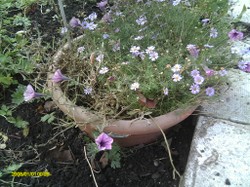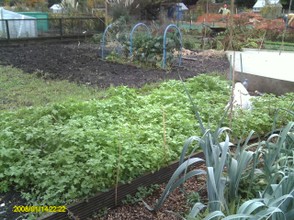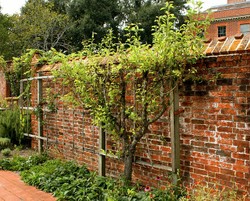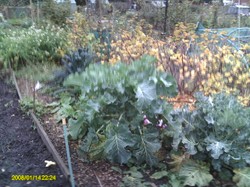People have become over-dependent on goods produced by others and purchased in shops. True we need shops, but there is another path, the path of self-reliance, where individuals recover their skills as producers and growers. This is becoming more important in the modern world, as climate change and growing population extert pressure on resources. Individuals need both the confidence to recognize that they can be self-reliant and the determination to acquire the skills to be so

Becoming more self-reliant
by frankbeswick
Depending on shops for all our needs is not desirable. We need to become self reliant by growing and making more of our own goods.
The basics
For me self-reliance has been a long term project that began to a limited extent when I was younger and steadily grew. It was a supplement for my earnings at one time, but as I age and become ever less employable in the market that favours the young, it has become an integral part of my life strategy.To be truthful. it always was the dream. Firstly, we must distinguish between the dream of self-sufficiency and the practice of self-reliance. Self-sufficiency is doing it all by yourself: having land, hunting. fishing, growing, making your own stuff, in blissful independence. This dream dies the first time you need surgery or have to call on the police [self reliance is not to be equated with doomsday prepping]. Self-reliance is doing as much as you can with the resources available to you, but knowing that you have to rely on outside food sources for some items.
Self-reliance is a mentality. To cultivate it you have to change your attitudes to wealth. Many people see wealth as money, but that's just a means of exchange. The carrots that I grow on my plot are wealth. The homemade wine that I make is wealth, as is the community orchard that we have on the allotment. Wealth is not always individually mine, but often it is ours. The bonds that I make with my neighbours by sharing some allotment produce with them are wealth; and they are not taxable. If you are mad on money, you will not be self-reliant. You will always need money, but you need to balance out your need for it with your interest in a self-reliant lifestyle.You also need to realize that the pursuit of a career is antithetical to self-reliance. Careers absorb so much time that you have little left for self-reliance.
You also must realize that you will need to rely on the opportunities in your area. I live inland, so sea fishing for food is not a viable technique for me. I do it but occasionally. While in the USA there are areas where people can hunt, Britain is crowded,and land is all owned by people with shooting rights. Forget it. Foraging is common in Britain, on lanes and on seashores, but in the urban area where I live it is limited to canal and river banks and roadsides. I certainly do some, but it does not provide a major part of my diet. In my case I have an allotment, a plot of land rented from the council, on which I grow vegetables and fruit, and I grow mushrooms at home. Home-made bread, wine and yoghurt are also part of my strategy.
Self sufficiency
 | Self-Reliance Inside each of us is genius waiting to be discovered, to be nourished and brought forth. This is the aim of Emerson's treatise "Self-Reliance", to teach us to bring forth this g... |
 | Self-Reliance Redefining the classic essay, this modern edition of Ralph Waldo Emerson’s most famous work, Self-Reliance, includes self-reflections from both historical and contemporary lumin... |
An integrated approach
Growing, cooking and preserving
It is not enough to produce your own food if you do not know what to do with it. Currently I have a glut of certain fruit and vegetables. This year the apple crop from my three trees has been great, and there are far too many to eat. I gave some to the allotment committee, it pays to keep friends with people at the top, and the rest will be mainly used in my cider press. The pressed juice is for cider and the remains are returned as compost.The pears and damsons have been disastrous, but that was probably the late frost that came in Britain's long cold spring this year that caused the dearth.
But I have also a glut of marrows and some very large pumpkins, along with a mass of climbing beans. My wife, Maureen, has bought a soup maker, which can turn allotment produce into vegetable soup. She won't allow me to use it, it's her toy and she's playing with it, but she does produce a regular supply of lovely soup. This is a tool that every self-reliant home should have, as it makes for great economies in food use. I am also purchasing a food dehydrator to dry certain fruit and vegetables.
Preserving is quite a skill, and several of my colleagues on the allotment make jam. We don't in our house, but you can always do a deal with someone, some of your produce for their jam. Trade is part of a self-reliant lifestyle. Pickling is also a useful skill, and you can add chuckneys to use up some produce
Tools
 | Nesco 600-Watt Food Dehydrator Dry fruit, vegetables, and jerky in hours instead of days with this 600-watt food dehydrator. The unit's patented Converga-Flow drying system forces air down the exterior pressu... |
 | Nesco FD-80A Square-Shaped Dehydrator Amazon Frustration-Free Packaging Dry fruit and vegetables, herbs and flowers, granola or strips of jerky in hours instead of days with this 700-watt food dehydrator. The unit's patented Converga-Flow drying sys... |
Confidence in skills
One of the problems of our education system is that it was geared to training many people to sit behind desks and give orders to people who worked with their hands. Too many young people were led to believe that they could not use their hands, that manual work was a skill that they did not have and in any case was beneath them. Some parents discouraged practical skills in their offspring so that they could be guided to a suitable office job with all the supposed status that such jobs enjoy.
You will not achieve a measure of self-reliance if you have not the confidence to develop new skills. Yes, some skills take much learning, but they are not the self-reliant ones: I am never going to need to develop the skills of neurosurgery, and at 63 I am unlikely to need military skills [and the military don't need me!] but there are daily skills that can be learned. I recently learned to sew so that I could mend clothes. Okay, they are not the clothes that I would wear to meet the Queen or the prime minister [I have never met either of them] but sewing extends the life of some of my gear. Self-reliant people should not be afraid to wear mended clothes [I am wearing some now]. They need to tackle some construction projects. I have erected polytunnels, but soon I am putting up a new greenhouse for the first time. Getting the glazing right will be a challenge. To build up my allotment I have had to use carpentry skills to make frames and a fruit cage.
tools
 | Cuisinart SBC-1000 Blend-and-Cook Soup Maker, Black Soup is On! The hottest blender to hit the market, the Cuisinart Blend and Cook Soup Maker, is causing quite the stir! This unique blender has a worldwide patent on the cooking ... |
 | Soup-A-Chef Electric Soup Maker Soup-A-Chef Electric Soup Maker by Trademark Home™ makes Soups from start to finish with no need for additional pots or pans!Simply add vegetables and stock, select soup program... |
Getting the balance right
Blending work and self-reliance
A year or so ago someone lived a year without money [and has written a book about it], but most of us cannot do this. So if we want to cultivate self-reliance we need a create balance between economic work and self-reliant work. I reckon that for writers a measure of self-reliance is a useful augmentation of their lives. They can find the time for writing and for self-reliant activities and creatively blend the two. I run a small, part time tuition business that I operate in the evenings, which augments my small pension and even smaller writing earnings. Adding to your work in the winter time, when crop growth has ceased, is also a good strategy for those blending economic work and self-reliance.
What I have found is that the people who have most difficulties running ther allotments are the professionals, particularly those who do it alone without the aid of family members. Modern professions take up so much time that there is little left for anything else.I have no interest in any career advancement, so I have more time for my genuine interests-self-reliance and writing.]
There will always be ways in which we can be more self-reliant. Some of us dream of having a smallholding [what the Americans call a homestead] where we can farm more fully, having the animals that we cannot keep in urban environments, but self-reliance does not need to wait for that dream to be realized. With many of us it never is. But we can be self-reliant in smaller ways in our urban live, using the resources available in our own areas as an alternative to the monetary economic system.
 | The Moneyless Man: A Year of Freeconomic Living The astonishing reality of living without our most important resource. Imagine a year without spending any money. Former businessman Mark Boyle did just that and here is his ext... |
 | Mini Farming: Self-Sufficiency on 1/4 Acre Start a mini farm on a quarter acre or less, provide 85 percent of the food for a family of four and earn an income. Mini Farming describes a holistic approach to small-area far... |
 | The Ultimate Self-Sufficiency Handbook: A Complete Guide to Baking, Crafts, Gardening, Preserving... A do-it-yourselfer’s dream guide to simpler, greener, and more sustainable living.This compact guide provides advice, tips, and step-by-step instructions for hundreds of project... |
You might also like
Growing in confined spacesAs the world urbanizes and land pressures grow, many people are turning to im...
As Winter ComesFor true allotment gardeners gardening does not cease in winter,







 Pilgrimage. A reviewon 06/15/2025
Pilgrimage. A reviewon 06/15/2025
 Leo the Fourteenthon 05/09/2025
Leo the Fourteenthon 05/09/2025
 The Melsonby Hoardon 03/25/2025
The Melsonby Hoardon 03/25/2025



Comments
Getting sufficient seeds would be difficult.
Online news sources this week indicate that UK-largest grocers Aldi, Asda, Morrisons and Tesco are restricting purchases of salad vegetables.
They mention Aldi and Tesco as placing 3-per-person limits on cucumber, pepper and tomato purchases.
They note Asda and Morrisons as respectively putting 3-per-person caps on broccoli, raspberries and 6 other unspecified vegetables and 2-per-person caps on broccoli and 3 other unspecified vegetables.
What would the unidentified vegetables most likely be among Asda and Morrisons produce?
Would it be easy and economical for one to start growing the above-mentioned edibles or would there be a problem with obtaining seeds?
Buttons at best.
The next-to-last subheading, Confidence in skills, indicates that "I recently learned to sew so that I could mend clothes."
Would the mending be mostly sewing buttons back on or would you know how to fix the ghastly tears that can happen with garden and lawn -- such that I always end up with knee holes to my jeans ;-D! -- activities indoors and out?
Arrow might be too large for an indoor plant. So might flames.Baby's breath and alyssum would look good in pots.
Revisiting all your wizzleys this time around brought to mind indoor/outdoor gardening questions that have come up recently.
I have mixed-wildflower seed packets containing alyssum, baby's breath, bachelor button, black-eyed Susan, blue and scarlet flaxes, calendula, catchfly, coreopsis, cosmos, evening primrose, Mexican hat, sweet William and yarrow.
Would any or all of them respond to being hanging plants in eastern- and southern-exposure porches or being in roomy pots and window-boxes inside on window sills with lots of southern sun?
If so, which would you recommend as most aesthetic and beneficial in combining in one container?
Sorry, I don't know the answer to this question. We have a law in Britain that forbids you to dig up any wild plant by the roots unless you own the land or have the landowner's permission. I have only encountered silverweed on other people's land. So I have never dug it up.
Revisiting this article made me think in a somewhat related direction of making boxty last month. I managed to make them nicely using your little sister Veronica's recipe. You mentioned in the comments there about silverweed being used before potatoes. Would you happen to know -- since silverweed grows here -- how that would taste if I substituted it for potatoes in her boxty recipe, or in any of her other recipes that include potatoes?
This guy that you mention seems to be a natural downshifter. It is nearly what I do. I have a small private tuition business, which is my main income; I mark examination papers twice a year; and I write, which earns a pittance. But I very occasonally do employed work, mainly invigilating public exams, but this is only two sessions a year. I am seeking ways to boost the self-reliant side of my activities. I would like some space suitable for mushroom growing, far more than there is under my stairs as at present.
I do feel that some day I will finish up in North Wales, where my married daughter lives, when she has children and my wife wants to do the grandmother act. So if and when this happens, I will need a bit of land and I will boost my self-reliant activities even more, maybe with some fishing as well.
I agree a person should try to not depend on the money system as much as possible, and become more self-reliant. The money system takes a lot of time and energy, leaving not much for anything else. I like these skills and methods you've laid out here for living in a more self-reliant way. I have considered doing something like this for some time. I know some people who do it and do something close to it. I know one guy who has not had a job in years, lives entirely through his self-employment. Definitely a better route than being totally dependent on a job.